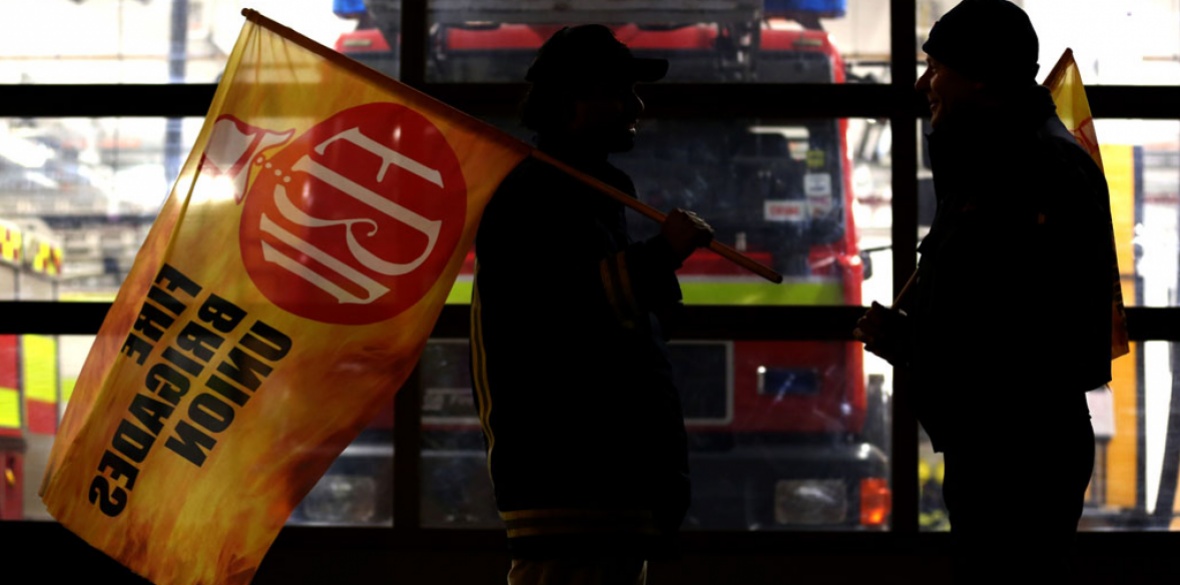This is the last article you can read this month
You can read more article this month
You can read more articles this month
Sorry your limit is up for this month
Reset on:
Please help support the Morning Star by subscribing here
IN OCTOBER 1918 a small group of firefighters, disillusioned with poor treatment at the hands of those who oversaw their service, set up the “Firemen’s Trade Union.” The founding aim was “a means to reorganise the conditions of their labours and thus bring more happiness into the lives of its members.”
Soon renamed the “Fire Brigades Union,” the union built its membership across Britain and has forged 100 years of supporting and protecting firefighters through an ethos defined in our motto “Unity is Strength.”
We want people outside our industry to understand the pride and connection that firefighters have for their union. It comes from our understanding of the achievements of previous generations of firefighters who built our remarkable profession and made it so highly valued by society. As firefighters we know our history and we understand that everything in our service had to be fought for and hard won by the Fire Brigades Union.
That fight still continues to this day and in our centenary year firefighters are still campaigning to reverse years and years of pay cuts, attacks on our pensions whilst still continually challenging the cuts to the fire and rescue service.
When I was elected as Scottish regional secretary last year, my first priority was to prepare our members and officials to lobby politicians of all parties to support our campaign “Cuts Cost Lives.” The previous four years had seen year on year budget cuts to the fire service amounting to £53 million in real terms.
Members and branches need to be organised and have the tools for an effective campaign so we readily made available professional briefing packs on how to lobby a politician as well as evidence and details of where the cuts were hitting hard.
Firefighters were and still are regular visitors to the Scottish Parliament and constituency offices making the case for more investment – and we must continue to keep that pressure up.
The campaigning that firefighters have been involved in needs to be applauded. They don’t just campaign for their own terms and conditions but also for improvements in the fire service to support both public safety and firefighter safety. That includes highlighting any deficiencies in crewing levels and appliance availability which determines how quickly a fire engine can be mobilised to an incident.
“When all is said and done, firefighting comes down to this: that a small number of people will go into a darkened, smoke-logged building, not knowing what they are going to meet, having faith in each other, in the long run prepared to risk their lives to save the lives of other people. In the long run, no matter what transformation we effect in the fire service, firefighting in its final stages remains just that. And we do not forget it.”
These were the words spoken at an FBU conference in 1960 in Rothesey by then FBU general secretary John Horner. They are as pertinent today, when discussions are taking place on transforming the Scottish Fire and Rescue Service, as they were when first spoken then.
We must continue to make sure that firefighters’ voices are at the heart of those discussions if we are to see a resilient fire and rescue service, capable of dealing with the full range of risks consistently across Scotland and the UK.
That requires resources and, most of all, the firefighters to do the job. The union wants the fire and rescue service to be democratically accountable, both to the public we serve and to the firefighters who work in it.
Scotland has always been a key part of the FBU throughout our 100 years of existence. We have produced great leaders and firsts such as former general secretary Ken Cameron and presidents Enoch Humphries, Ronnie Scott and first woman president Ruth Winters.
It’s important to pay tribute to the many officials who have come before us; like many trade unions there have been disagreements and differences but there is also a deep-rooted respect. That respect stems from the knowledge of the long hours, days away from the family home, the passion we have to strive for better pay, terms and conditions for our members and the love we have for our profession.
I want to thank all those that have kept the FBU from being eaten up by bigger unions. It is imperative that we stay an independent trade union and maintain our reputation as the professional voice of firefighters and the defenders of the fire and rescue service. I am incredibly proud of the role my union has played these last 100 years: our internationalism, our socialism and our solidarity with others in the movement — here’s to the next 100!
Denise Christie is Scottish secretary of the FBU.











